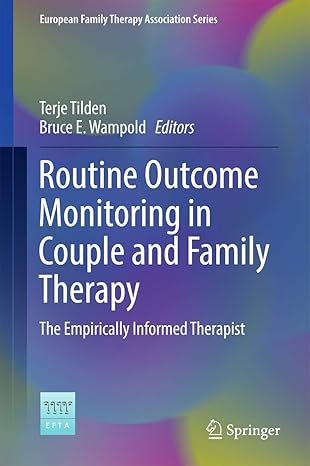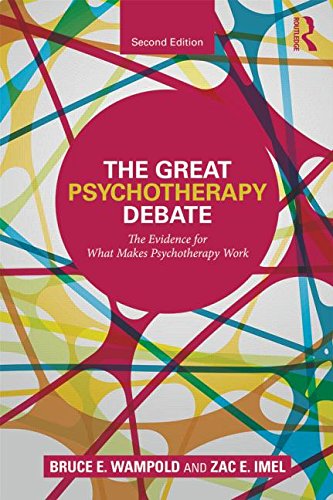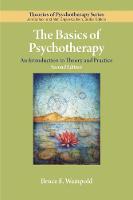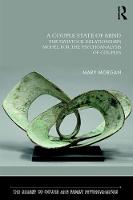Routine Outcome Monitoring in Couple and Family Therapy: The Empirically Informed Therapist

Book Details
- Publisher : Springer
- Published : July 2018
- Cover : Paperback
- Pages : 302
- Category :
Family, Couple and Systemic Therapy - Catalogue No : 98395
- ISBN 13 : 9783319844596
- ISBN 10 : 3319844598
Also by Bruce E. Wampold
The Basics of Psychotherapy
Price £39.50
There are currently no reviews
Be the first to review
This research-to-practice manual introduces Routine Outcome Monitoring (ROM), a feedback-based approach to preventing impasses and relapses in couple and family therapy as well as within other psychotherapy approaches. This book discusses how ROM has been developed and experienced within the Norwegian couples and family therapy community in line with international trends of bridging the gap between clinical practice and research. Locating the method in evidence-based systemic practice, contributors describe the core techniques, tools, and process of ROM, including examples of effective uses of feedback over different stages of therapy, with individuals in family context, and implemented in different countries. Giving clients this level of control in treatment reinforces the concept of therapy as a collaborative process, fostering client engagement and involvement, commitment to treatment, and post-treatment progress. ROM is applicable across clinical settings and clinician orientations for maximum utility in work with clients, and in building therapeutic self-awareness.
Table of Contents
Introduction
1. How Do I Know Whether My Efforts Are Helpful for the Client? Implementing Feedback in Norway
Terje Tilden
Part I - Couple and Family Therapy in Norway
2. The History of Family Therapy in Norway
Vigdis Wie Torsteinsson, Astri Johnsen
3. A Sociological Perspective on Changes in the Family in Norway
Liv Johanne Syltevik
4. Family Therapy and Philosophy: Inspiration and Frustration
Harald Holm Nilssen
Part II - Practice-Oriented Research and Routine Outcome Monitoring
5. The Systemic Therapy Inventory of Change—STIC: A Multi-systemic and Multi-dimensional System to Integrate Science into Psychotherapeutic Practice
William M. Pinsof
6. The Norwegian Directorate for Children, Youth and Family Affairs’ Efforts to Implement Feedback in Routine Couple and Family Therapy
Marianne Bie
7. Feedback as Means to Enhance Client–Therapist Interaction in Therapy
Rolf Sundet
8. Does Feedback Enhance User Involvement in Therapy?
Camilla Jensen Oanes
9. Empirically Informed Therapy Conducted at the Family Unit, Modum Bad
Bente Barstad, Hilde Opstvedt, Terje Tilden
10. Family Therapy and Holistic Complexity—An Ethnographic Approach to Therapeutic Practice in a Norwegian Psychiatric Clinic
Halvard Vike, Heidi Haukelien
11. An Anthill of Questions that Made Me Prepare for the First Session: A Clinical Vignette of the Usage of STIC Feedback System
Rune Zahl-Olsen, Camilla Jensen Oanes
12. Lessons Learned from the Implementation of a Feedback System in Couple and Family Therapy
Åshild Tellefsen Håland, Terje Tilden
Part III - Reflections from Abroad on Couple and Family Therapy in Norway
13. How, When, and Why Do People Change Through Psychological Interventions?—Patient-Focused Psychotherapy Research
Julian A. Rubel, Wolfgang Lutz
14. How to Use Research to Become More Effective Therapists
Bruce E. Wampold
15. How Can Outcome Data Inform Change? Experiences from the Child Mental Health Context in Great Britain, Including Barriers and Facilitators to the Collection and Use of Data
Jenna Jacob, Elisa Napoleone, Victoria Zamperoni, Lily Levy, Matt Barnard, Miranda Wolpert
About the Editor(s)
Terje Tilden is the associate research director at Modum Bad, a leading research institute in Norway, where he also serves as an individual, group, and family therapist. He has presented a broad variety of research in cognitive therapy, both internationally and within Norway. In addition, he has published numerous articles in journals such as Journal of Marital and Family Therapy, Journal of Family Therapy, and Contemporary Family Therapy.
Bruce E. Wampold, who was trained in mathematics (University of Washington) before earning his doctorate in Counseling Psychology (University of California, Santa Barbara), is the Patricia L. Wolleat Professor of Counseling Psychology at the University of Wisconsin—Madison as well as Director, Research Institute at Modum Bad Psychiatric Center in Vikersund, Norway. Currently his work involves understanding psychotherapy from empirical, historical, and anthropological perspectives, which has led to the development of a contextual model of psychotherapy. He is a Fellow of the American Psychological Association, a Diplomate in Counseling Psychology of the American Board of Professional Psychology, the recipient of the 2007 Distinguished Professional Contributions to Applied Research Award from the American Psychological Association, and an Honorary Doctor in the Social Sciences, Stockholm University.
Customer Reviews
Our customers have not yet reviewed this title. Be the first add your own review for this title.
You may also like
A Couple State of Mind: The Tavistock Relationships Model for the...
Mary Morgan
Price £34.03
save £2.96
Love and War in Intimate Relationships: Connection, Disconnection, and Mutual...
Marion F. Solomon
Price £24.99










